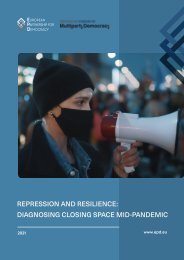Thinking Democratically: A Comprehensive Approach to Countering and Preventing Shrinking Space
You also want an ePaper? Increase the reach of your titles
YUMPU automatically turns print PDFs into web optimized ePapers that Google loves.
This tension resulting from the lack of conceptual clarity on closing space lies at the heart of the<br />
mixed <strong>and</strong> limited results from the international community’s efforts <strong>to</strong> counter closing civic space.<br />
Brechenmacher <strong>and</strong> Carothers have argued that the international community is somewhat stuck in<br />
its response <strong>to</strong> restricted civic space, <strong>and</strong> call for a strategic framework for responding <strong>to</strong> the<br />
challenge of closing democratic space – including civic space <strong>and</strong> other challenges – so as <strong>to</strong> ensure<br />
unity <strong>and</strong> focus, <strong>and</strong> integrate the strategic response <strong>to</strong> closing democratic space within the wider<br />
foreign policy agenda. 16 Likewise, the European Centre for Development Policy Management has<br />
called on donors <strong>to</strong> respond <strong>to</strong> the wider challenge of closing democratic space rather than limit its<br />
focus <strong>to</strong> civil society. 17<br />
This paper is based on research in countries in Latin America, Eastern Europe <strong>and</strong> sub-Saharan Africa,<br />
conducted by local experts. 18 Each of these case studies detail the state of democracy <strong>and</strong> human<br />
rights in the country, analysing the drivers <strong>and</strong> strategies for closing democratic space, with special<br />
attention <strong>to</strong> the role of political parties, donors <strong>and</strong> civil society. Democratic space is defined here<br />
as a “produced social space in which there is political contestation <strong>and</strong> inclusiveness reflected in the<br />
extent <strong>to</strong> which citizens have the opportunity <strong>to</strong> (a) formulate their preferences, (b) articulate their<br />
preferences <strong>and</strong> (c) have their preferences weighed equally in the conduct of government”. 19 The<br />
closing of democratic space then takes the form of state <strong>and</strong> non-state ac<strong>to</strong>rs limiting space <strong>and</strong><br />
opportunities for political contestation <strong>and</strong> participation. This includes special attention <strong>to</strong> civic<br />
space, alongside the rule of law, separation of powers, checks <strong>and</strong> balances <strong>and</strong> fair <strong>and</strong> inclusive<br />
political participation <strong>and</strong> contestation.<br />
This paper departs from two key observations: Firstly, it is clear that there is a need <strong>to</strong> clarify the<br />
notion of “shrinking space” in relation <strong>to</strong> the trend of au<strong>to</strong>cratisation. Secondly, despite the wealth<br />
of analysis of civic space, responses have so far failed <strong>to</strong> succinctly operationalise analysis in<strong>to</strong> action.<br />
The paper responds <strong>to</strong> these observations by firstly providing further evidence on the strategies <strong>and</strong><br />
features of reduced democratic space, including coordinated action <strong>to</strong> clamp down on civic space<br />
through 7 case studies. The paper breaks down the strategies in<strong>to</strong> three categories: a) closing civic<br />
space, b) creating an uneven playing field <strong>and</strong> c) undermining the separation of powers <strong>and</strong> the rule<br />
of law. It follows this by looking at several key ac<strong>to</strong>rs <strong>and</strong> the role that they play in the phenomenon<br />
of shrinking space. It ends by extrapolating evidence from prior analysis <strong>and</strong> the commissioned case<br />
studies in order <strong>to</strong> provide recommendations for action.<br />
16<br />
Ibid.<br />
17<br />
Bossuyt, J. & Ronceray, M. (2020): Claiming back civic space: <strong>to</strong>wards approaches fit for the 2020s? European Centre for<br />
Development Policy Management. Available here.<br />
18<br />
Country case studies were conducted in Guatemala, Honduras, El Salvador, Georgia, Indonesia, Kenya <strong>and</strong> Zimbabwe.<br />
19<br />
Netherl<strong>and</strong>s Institute for Multiparty Democracy (2017): research methodology on closing democratic space.<br />
10

















